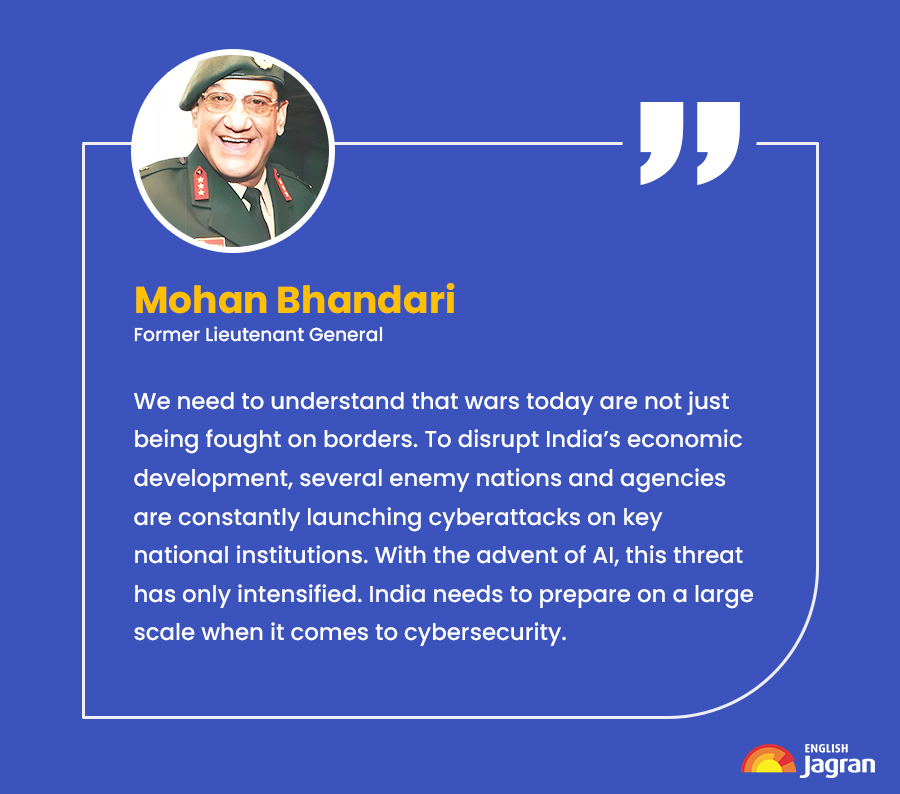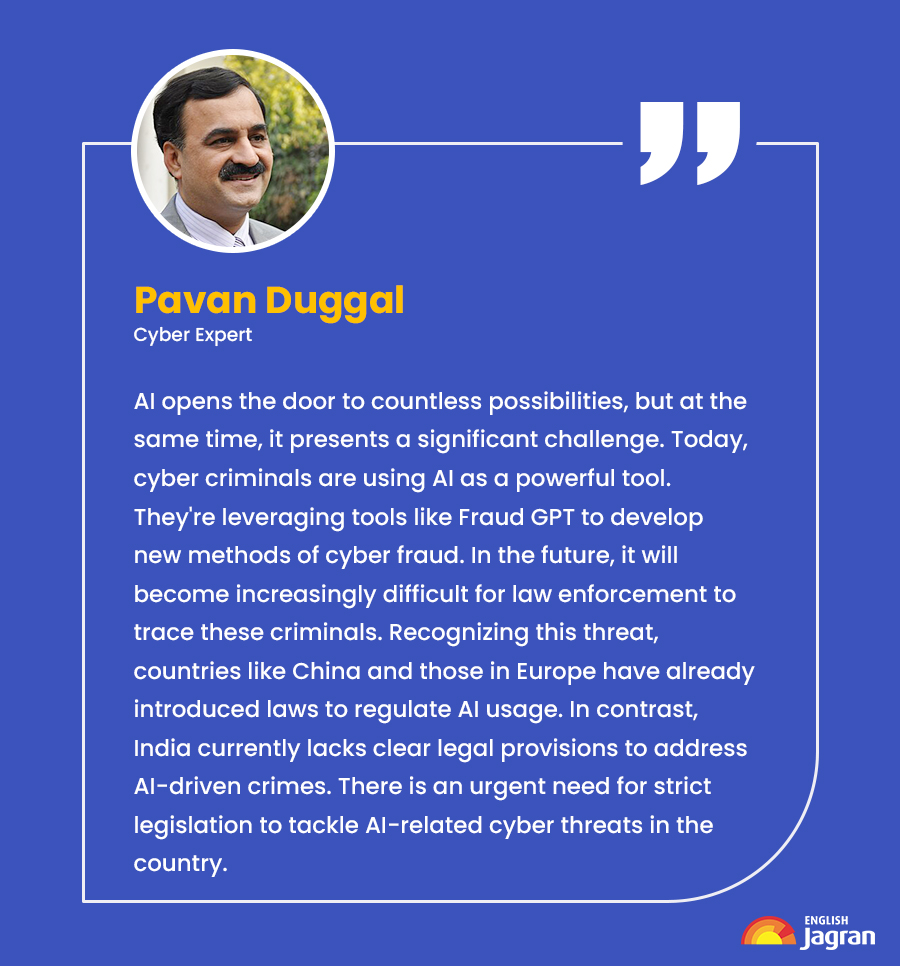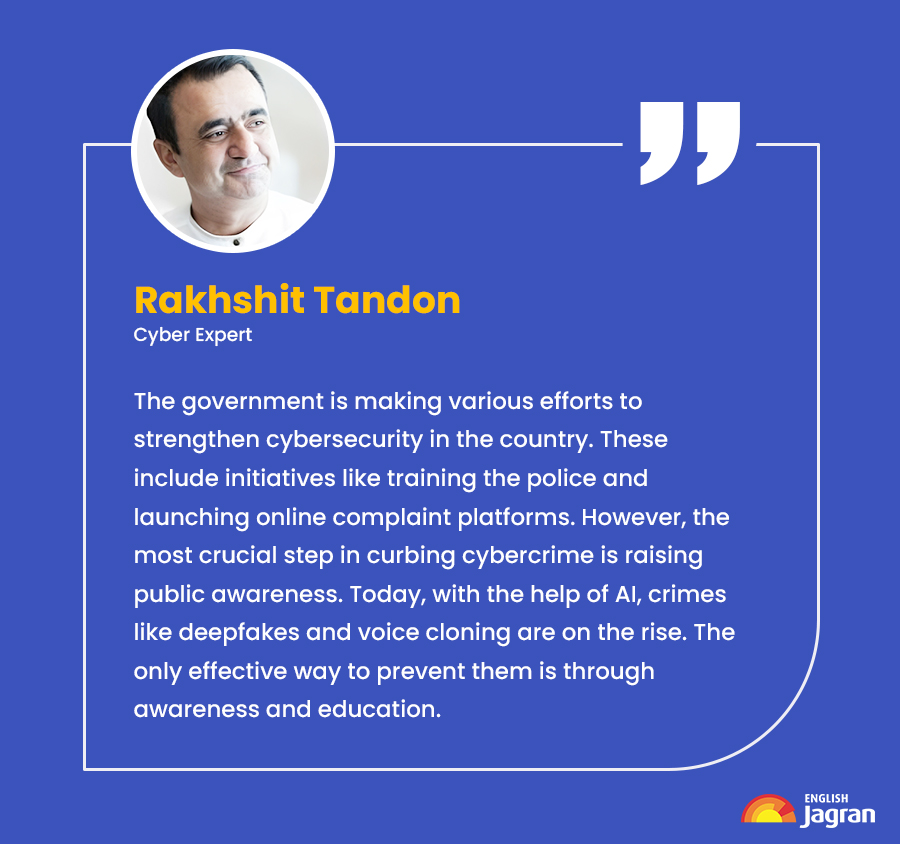- By Vivek Tiwari
- Wed, 09 Apr 2025 06:34 PM (IST)
- Source:JND
Artificial Intelligence has opened up a world of new possibilities, but its misuse has also raised serious concerns. According to the World Economic Forum’s Global Cybersecurity Outlook 2025, generative AI is emerging as a major challenge to cybersecurity worldwide. Rapid technological advancements and growing geopolitical tensions have further intensified the challenges in the cyberspace domain.
Artificial Intelligence has opened up a range of new possibilities, but its misuse has also raised serious concerns. According to the Global Cybersecurity Outlook 2025 by the World Economic Forum, generative AI is emerging as a major threat to cybersecurity across the globe. Rapid technological advancements and escalating geopolitical tensions have further intensified challenges in the cyberspace domain, posing a growing risk to the global cybersecurity framework. The World Economic Forum conducted a survey across 57 countries, gathering responses from around 409 institutions. According to the report, nearly 47 per cent of organisations worldwide identified AI-driven attacks as their top concern. Many institutions also highlighted the shortage of trained cybersecurity professionals as a key hurdle in effectively combating these evolving threats.
The report states that cyber criminals are increasingly using AI to carry out sophisticated attacks, and this could become a major challenge in the near future. According to Jeremy Jurgens, Managing Director at the World Economic Forum, the threat of cybercrime has grown significantly due to AI. Rising geopolitical tensions are further compounding these challenges. The survey revealed that one in three CEOs acknowledged cyber espionage and AI-driven intellectual property theft as emerging high-risk threats. The report also highlights a global shortage of cybersecurity skills. In 2024, the shortage of trained professionals capable of countering cybercrime was estimated at around 8 per cent. Today, nearly two-thirds of organisations are operating without adequate cybersecurity experts.
According to Paolo Dal Cin, Global Lead at Accenture Security, “Cybersecurity now directly impacts financial stability. Today, organisations need to make large-scale investments with cybersecurity as a top priority.”
Former Lieutenant General Mohan Bhandari says we must understand that today wars are no longer confined to borders. India has made commendable economic progress in recent years, and to disrupt this growth, several hostile nations and agencies are making continuous efforts. Among these, cyberattacks have emerged as a major weapon. Many of India’s critical and sensitive institutions are under constant threat of cyberattacks. The rise of AI has further intensified this danger. Countries like China, Pakistan and others have developed dedicated cyber armies whose sole objective is to target the economic and strategic infrastructure of their rivals or enemy nations. In this scenario, India urgently needs to bolster its cybersecurity preparedness on a large scale. Given the shifting geopolitical landscape and growing instability, strengthening cyber defenses is now more important than ever. Whether it’s the Israel-Hamas conflict or the Russia-Ukraine war, these recent events have clearly shown that any future waranywhere in the world will have a significant cyber warfare component. If a country's cyber defenses are weak, it will struggle to endure the long-term impact of such conflicts.

Cyber expert Pavan Duggal states that AI has emerged as a powerful modern technology with immense potential. It has made several tasks significantly easier. However, the risk of its misuse is also growing. Cybercriminals are now using AI as a tool to carry out sophisticated frauds. Recently, it was revealed that they are leveraging tools like Fraud GPT to devise new methods of cyber scams. We must understand that due to the growing use of AI, solving cybercrime cases in the future will become increasingly difficult. During investigations, law enforcement may eventually reach the AI tool used, but tracking down the actual perpetrators could become extremely challenging. This calls for proactive vigilance starting now. Recognising this threat, countries like China and the European Union have already introduced clear and separate laws to regulate AI-related crimes. New provisions are being created to govern AI usage. In India, however, there is currently no clear legal framework to address the misuse of AI or the crimes stemming from it. The government must urgently consider enacting strong legislation to tackle this emerging threat.

In recent years, the Indian government has undertaken several initiatives to curb cybercrime. Cyber expert Rakhshit Tandon explains, “A large number of police personnel across the country are being trained to tackle cybercrime, with the help of IITs and other specialised technical institutions. The government has also launched an online complaint platform to make it easier for people to report cybercrimes. Additionally, through initiatives like 'Cyber Dost', efforts are being made to raise public awareness about cyber threats. AI has now emerged as a major cybersecurity threat. Crimes such as deepfakes and voice cloning are becoming more prevalent due to the misuse of AI. To combat this, it is essential to raise awareness among the general public. Only through caution and vigilance can such crimes be effectively prevented.

Government Initiatives to Curb Cybercrime
To tackle all forms of cybercrime in a coordinated and comprehensive manner, the Ministry of Home Affairs has established the Indian Cyber Crime Coordination Centre (I4C). As part of this initiative, the National Cyber Crime Reporting Portal (https://cybercrime.gov.in) has been launched, enabling citizens to report all types of cybercrime incidents, with special focus on crimes against women and children. Complaints filed on the portal are registered as FIRs and forwarded for necessary action. To ensure the timely reporting of financial fraud and prevent misappropriation of funds by fraudsters, the Citizen Financial Cyber Fraud Reporting and Management System was launched under I4C in 2021. So far, over 994,000 complaints have been registered, helping recover more than 3,431 crore rupees in financial losses. Additionally, to support victims of cybercrime, the government has introduced a toll-free National Cyber Crime Helpline number (1930).
Under the Indian Cyber Crime Coordination Centre (I4C), 7,330 officials from various ministries and departments of the Government of India have been trained in cyber hygiene practices. As of November 15, 2024, over 669,000 SIM cards and 132,000 IMEI numbers, reported by police officials, have been blocked by the Government of India to curb cyber fraud. To enhance the capabilities of police and judicial officers in critical areas such as cybercrime investigation and forensics, I4C has also developed a large-scale Massive Open Online Courses (MOOC) platform named the 'CyTrain Portal'. This platform offers specialized training through online courses to improve cyber law enforcement and investigation proficiency across the country.
Strengthening International Cooperation
India and the United States have signed a Memorandum of Understanding (MoU) in Washington, DC, to enhance cooperation in cybercrime investigations. Both countries have agreed to increase collaboration and information sharing related to cyber threat intelligence and digital forensics in criminal investigations. This agreement will help relevant agencies in both nations strengthen cooperation and training in the use of cyber threat intelligence and digital forensics for criminal investigations. Cybercrime is closely linked to the common security challenges faced by both India and the U.S., such as terrorism and violent extremism, terrorist financing, drug trafficking, organized crime, human trafficking, illegal migration, money laundering, and transportation security. This MoU on cybercrime investigations will further strengthen India-US security cooperation as part of the broader and global strategic partnership between the two countries.
(This article was translated for Jagran English by Akansha Pandey.)

